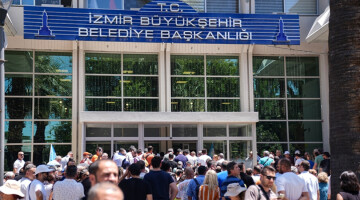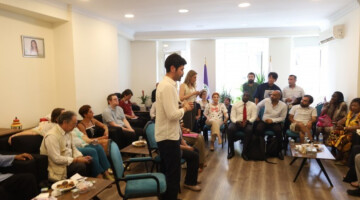Various Kurdish parties have claimed the hunger strike resistance demanding the end of isolation against Kurdish People's Leader Abdullah Öcalan since 7 November when DTK co-chair and HDP Hakkari MP Leyla Güven went on hunger strike in Amed prison.
The hunger strike has since spread to dozens of cities and in prisons.
A delegation from the Kurdish Parties and Movements Joint Diplomatic Committee, including the Patriotic Union of Kurdistan (PUK), the Kurdistan Islamic Unity Party (Yekgirtu) and the Syrian Kurds Democratic Union Party (PYDKS-EL WAHDE), the Kurdistan Communist Party (KKP), and the representatives of KNK and KODAR, visited the hunger 14 strikers in Strasbourg on the 84th day of their fast.
Among the visitors were: Şex Şemal (PUK), Ebdulbari Ezo (PYDKS-EL WAHDE), Hesen Özkan (KKP), Aras Şalli (Yekgirtu), Zübeyir Aydar (KNK executive), Refik Gefur (KNK member) and Brussels Kurdish Institute President Derweş Ferho.
The hunger strikers welcomed the party representatives, meeting with them despite their health condition.
PUK: Isolation cannot be accepted
Şex Şemal, PUK foreign affairs representative, pointed out the importance of national unity of the Kurdish people. Şemal added that isolation against Kurdish People's Leader Abdullah Öcalan cannot be accepted.
Şemal said that the hunger strike is very valuable and praised the activists who have acted as self-sacrificing as the guerrillas who sacrificed their lives in the war.
Koç: Support from all Kurdish parties very important
Speaking on behalf of the hunger strikers, Kurdish Democratic Society Congress (KCDK-E) co-chair Yüksel Koç underlined that the support of political parties from other parts of Kurdistan was very important. Koç underlined that isolation is not only targeting Öcalan or Northern Kurdistan people but all parts of Kurdistan.
Koç also reminded the joint actions of all the parts of Kurdistan against the occupation attacks on Kobanê and Afrin, and underlined the importance of claiming the hunger strike resistance.
Bokani: Kirkuk and Afrin were occupied because there was no Kurdish unity
Hunger striker Kardo Bokani, who was carrying out diplomatic work with the KNK, said that the lack of national unity and support would affect the level of success of their actions. Bokani stressed that the occupation of Kirkuk and Afrin were possible because there was “no Kurdish unity.”
Call for national unity
All members of the delegation stressed the importance of national unity in their statements.
Hesan Özkan said that the Turkish state aimed at destroying the Kurdish Freedom Movement during the Resolution Process it ended up disrupting.
Speaking on behalf of PYDKS-EL WAHDE, Ebdulbari Ezo stated their support for the hunger strike resistance.
What Kurdish people want most from the Kurdish parties is the creation of the National Congress, said Ezo, because it will facilitate the peaceful solution of the Kurdish issue in the four parts of Kurdistan.
In his speech, Yekgirtu representative Aras Şalli underlined the humanitarian aspect of the hunger strike and emphasized that the demands of the hunger strikers are justified.
Zubeyir Aydar, from the KCK Executive Committee, recalled that the resistance was carried out not only in Strasbourg but involved thousands of prisoners.
Aydar stressed that the PKK's hunger strike resistance in 1982 turned prisons into a field of struggle and emphasized that the current resistance is far more comprehensive than those in the past.
Breaking the isolation of Imrali, said Aydar, will open the way to negotiation and peace, and added that all Kurdish parties should have the hunger strike resistance on their agenda.











